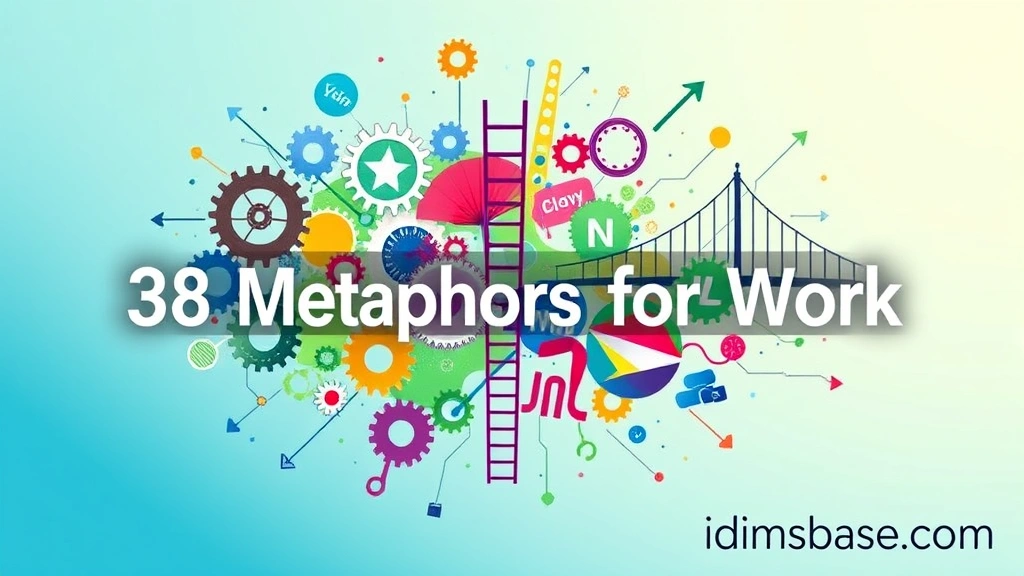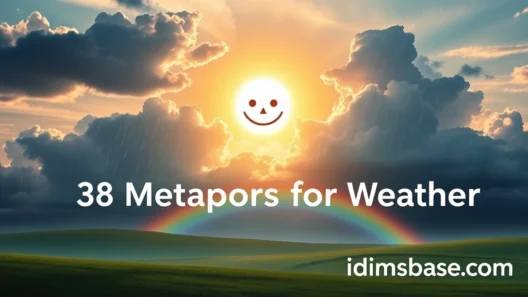Ever feel like your work life needs a little more sparkle? Or perhaps you're searching for the perfect way to describe that daily grind to a friend? Well, you've landed in the right place! We're about to dive into a treasure trove of 38 fantastic metaphors for work. These aren't just fancy words; they're clever ways to see your job, your career, and your daily tasks in a whole new light.
Metaphors help us understand complex ideas by comparing them to something simpler or more familiar. They add color, depth, and sometimes even a touch of humor to our conversations. So, whether you're climbing the corporate ladder, navigating a creative project, or just trying to get through Monday, these metaphors will give you a fresh perspective. Let's get started and find the perfect phrase to capture your work experience!
The Daily Grind: Metaphors for Routine Work
Sometimes, work feels like a never-ending cycle. These metaphors perfectly capture that sense of routine, effort, and persistence.
1. A treadmill
You're moving, but are you really going anywhere? This classic metaphor highlights repetitive tasks that don't seem to lead to much progress. It's all about the effort without the journey.
2. A hamster wheel
Similar to a treadmill, but with a touch more futility. You're running hard, expending energy, but remaining in the same spot. It perfectly describes busywork.
3. Pushing a boulder uphill
This evokes a sense of immense effort against resistance. It’s a Sisyphean task, feeling heavy and relentless. Every step is a struggle.
4. Rowing against the current
Imagine the effort needed to move forward when everything is pushing you back. This speaks to challenging circumstances or difficult projects.
5. A marathon
Work can be a long, arduous journey requiring endurance. It's not a sprint; it's about pacing yourself for the long haul.
6. A assembly line
Repetitive, standardized tasks where each person contributes a small piece to a larger whole. It's about efficiency and uniformity.
The Creative Journey: Metaphors for Innovative Work
For those whose work involves imagination, problem-solving, and bringing new ideas to life, these metaphors paint a vivid picture.
7. Painting a masterpiece
Each stroke, each color, builds towards a magnificent creation. This metaphor speaks to detailed, artistic, and fulfilling work.
8. Sculpting a vision
Starting with raw material and shaping it into something beautiful and meaningful. It's about precision and bringing an idea into being.
9. Weaving a tapestry
Interconnecting various threads and ideas to create a rich, complex, and beautiful whole. It highlights collaboration and intricate design.
10. Planting seeds
Nurturing ideas from their inception, watching them grow, and eventually yielding fruit. This is about long-term vision and growth.
11. Building a bridge
Connecting two previously separate points, enabling flow and progress. It speaks to problem-solving and facilitating connections.
12. Solving a puzzle
Fitting pieces together, overcoming challenges, and finding the solution. This is perfect for analytical or investigative work.
The Battlefield: Metaphors for Challenging Work

Sometimes, work feels like a constant struggle, a fight for survival, or a strategic game. These metaphors capture that intensity.
13. A battleground
Where challenges are enemies, and success is victory. It implies conflict, strategy, and perseverance.
14. A chess game
Every move is strategic, requiring foresight and planning. It's about outsmarting competitors or obstacles.
15. Navigating a minefield
Every step is risky, requiring caution and careful consideration. It highlights dangerous or high-stakes environments.
16. Climbing a mountain
Overcoming obstacles, pushing limits, and reaching new heights. It signifies ambition and overcoming great challenges.
17. Walking a tightrope
Balancing precision, risk, and skill to avoid falling. This is about delicate situations requiring extreme care.
18. A pressure cooker
High stress, intense demands, and a constant need to perform under duress. It speaks to overwhelming environments.
The Growth Path: Metaphors for Career Development
Work isn't just about what you do today; it's about where you're going. These metaphors describe the journey of professional growth.
19. Climbing a ladder
Each rung represents a step up in your career. It's about progression and reaching higher levels.
20. Tilling the soil
Preparing the ground for future growth, nurturing your skills. It's about foundational work and development.
21. Forging a path
Creating your own unique career trajectory, often through uncharted territory. It's about innovation and leadership.
22. Building a foundation
Laying strong groundwork for future success and stability. This is about essential skills and knowledge.
23. Polishing a gem
Refining your skills and talents to reveal their true brilliance. It's about continuous improvement and mastery.
24. Setting sail
Embarking on a new professional adventure, exploring new opportunities. This signifies new beginnings and exploration.
The Collaborative Endeavor: Metaphors for Teamwork

Working with others is a significant part of many jobs. These metaphors highlight the dynamics of collective effort.
25. A symphony orchestra
Each instrument plays its part, contributing to a harmonious whole. It's about coordination, skill, and collective beauty.
26. A well-oiled machine
All parts work together smoothly and efficiently to achieve a common goal. It speaks to seamless collaboration.
27. Building a house
Each team member contributes essential components, from foundation to roof. It's about collective construction and shared vision.
28. Rowing in unison
Everyone pulls their weight in the same direction, propelling the team forward. It's about synchronized effort and shared goals.
29. A beehive
Everyone is busy, contributing to the collective good, creating something valuable together. It implies industriousness and community.
30. A puzzle coming together
Each person brings a unique piece that fits perfectly with others to complete the picture. It's about complementary skills.
The Transformative Experience: Metaphors for Impactful Work
Some work changes things, either for you or for the world. These metaphors capture that profound effect.
31. Lighting a beacon
Guiding others, providing direction and hope. It's about leadership and inspiration.
32. Turning a new leaf
Starting fresh, embracing change, and moving in a new direction. This is about renewal and opportunity.
33. Unlocking a door
Gaining access to new opportunities, knowledge, or solutions. It signifies discovery and progress.
34. Striking gold
Discovering something incredibly valuable or achieving a major breakthrough. It's about significant success.
35. Catalyzing a reaction
Initiating change, speeding up processes, and creating transformation. It speaks to being an agent of change.
36. Spreading ripples
Creating an impact that extends far beyond the initial action. It's about influence and lasting effects.
37. Writing a new chapter
Marking a significant new phase or direction in your professional story. This is about progression and evolution.

38. Planting a flag
Claiming new territory, marking a significant achievement or pioneering effort. It signifies accomplishment and leadership.
Key Takeaways
- Metaphors add color: They make descriptions of work more vivid and engaging.
- Perspective matters: Using metaphors can change how you view your own work challenges and achievements.
- Communication is key: They help you articulate complex work experiences in simple, relatable terms.
- Variety is the spice of life: From "treadmill" to "symphony orchestra," there’s a metaphor for every work scenario.
- Empower your language: Choose metaphors that resonate with your feelings about work, whether it's a "battleground" or "painting a masterpiece."
FAQ Section
Q1: What is a metaphor?
A metaphor is a figure of speech that directly compares two unlike things without using "like" or "as." It states that one thing is another, even though it's not literally true. For example, "Work is a marathon" directly compares work to a marathon to highlight its long, enduring nature.
Q2: Why are metaphors useful for describing work?
Metaphors are incredibly useful because they:
- Simplify complex ideas: They help us understand abstract concepts like "work" by relating them to concrete experiences.
- Add emotional depth: They can convey feelings and attitudes towards work (e.g., "pressure cooker" implies stress).
- Enhance communication: They make descriptions more engaging, memorable, and relatable for your audience.
- Provide new perspectives: They can help you reframe your own experiences and challenges.
Q3: Can I use these metaphors in professional settings?
Absolutely! Using metaphors in professional settings can make your communication more impactful and memorable. For example, when talking about a challenging project, saying "it felt like rowing against the current" is much more evocative than just "it was difficult." They can be great for presentations, team meetings, or even just discussing your day. Just make sure the metaphor is appropriate for your audience and the context.
Q4: How can I come up with my own metaphors for work?
To create your own metaphors, think about:
- The core feeling or characteristic of the work: Is it repetitive? Creative? Challenging? Collaborative?
- Something completely unrelated that shares that characteristic: If it's repetitive, what else is repetitive? A treadmill? A hamster wheel?
- Directly compare them: "My work is a treadmill."
Practice by observing your daily tasks and trying to connect them to unexpected things.
Q5: Are there any metaphors that are generally negative or positive?
Yes, many metaphors carry inherent connotations. For instance:
- Negative/Challenging: "Hamster wheel," "pushing a boulder uphill," "minefield," "pressure cooker." These often describe feeling stuck, overwhelmed, or facing significant obstacles.
- Positive/Empowering: "Painting a masterpiece," "sculpting a vision," "building a bridge," "lighting a beacon," "striking gold." These often describe work that is fulfilling, creative, impactful, or successful.
Understanding these connotations helps you choose the right metaphor to express your sentiment.
Q6: How do metaphors differ from similes?
The key difference lies in the comparison. A metaphor states that one thing is another (e.g., "Work is a marathon"). A simile compares two things using "like" or "as" (e.g., "Work is like a marathon" or "Work is as long as a marathon"). Both are figures of speech that draw comparisons, but metaphors are more direct and often more impactful.
Q7: Can a single job be described by multiple metaphors?
Definitely! A single job can have many facets. A project might start feeling like "navigating a minefield" due to initial challenges, then become "building a bridge" as you connect different ideas, and finally feel like "painting a masterpiece" as you deliver the final, polished product. Your experience of work can evolve, and different metaphors can describe different stages or aspects of your role.
Q8: How can I use these metaphors to boost my morale or perspective?
When you feel stuck or uninspired, try reframing your work using a more positive or empowering metaphor. If you're feeling like you're on a "hamster wheel," try to find aspects that are "planting seeds" for future growth or "polishing a gem" in terms of skill development. Shifting your perspective through language can genuinely change your outlook and motivation. It helps you see beyond the immediate task to the larger purpose or potential.
We hope this deep dive into metaphors for work has sparked some new ways for you to think and talk about your professional life! Which metaphor resonates most with you today? Share your thoughts and let's keep the conversation going!






